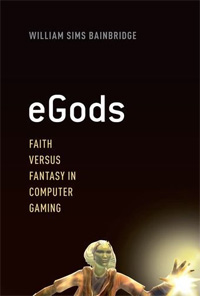 PopMatters includes a lengthy excerpt and summary of an intriguing volume by William Sims Bainbridge, eGods: Faith Versus Fantasy in Computer Gaming (Oxford University Press, 2012). The publisher’s website includes the following description:
PopMatters includes a lengthy excerpt and summary of an intriguing volume by William Sims Bainbridge, eGods: Faith Versus Fantasy in Computer Gaming (Oxford University Press, 2012). The publisher’s website includes the following description:
What is the relationship between religion and multi-player online roleplaying games? Are such games simply a secular distraction from traditional religious practices, or do they in fact offer a different route to the sacred?
In eGods, a leading scholar in the study of virtual gameworlds takes an in-depth look at the fantasy religions of 41 games and arrives at some surprising conclusions. William Sims Bainbridge investigates all aspects of the gameworlds’ religious dimensions: the focus on sacred spaces; the prevalence of magic; the fostering of a tribal morality by both religion and rules programmed into the game; the rise of cults and belief systems within the gameworlds (and how this relates to cults in the real world); the predominance of polytheism; and, of course, how gameworld religions depict death. As avatars are multiple and immortal, death is merely a minor setback in most games. Nevertheless, much of the action in some gameworlds centers on the issue of mortality and the problematic nature of resurrection. Examining EverQuest II, Lord of the Rings Online, Rift, World of Warcraft, Star Wars: The Old Republic, and many others, Bainbridge contends that gameworlds offer a new perspective on the human quest, one that combines the arts, simulates many aspects of real life, and provides meaningful narratives about achieving goals by overcoming obstacles. Indeed, Bainbridge suggests that such games take us back to those ancient nights around the fire, when shadows flickered and it was easy to imagine the monsters conjured by the storyteller lurking in the forest.
Arguing that gameworlds reintroduce a curvilinear model of early religion, where today as in ancient times faith is inseparable from fantasy, eGods shows how the newest secular technology returns us to the very origins of religion so that we might “arrive where we started and know the place for the first time.”
Features
A book from a leading scholar in the study of virtual gameworlds.
Based on five years of intensive research into every facet of the gameworlds, including 5,000 hours inside the virtual worlds.
Covers 41 different games.
The PopMatters essay includes the following conclusion:
This book does not claim that multiplayer online games will supplant religion, but that many of religion’s historical functions have already been taken over by other institutions of society, in the process of secularization, and games will play a role in the further erosion of faith. Quite apart from what psychological and social functions games may play, they provide a vantage point from which to consider changes happening in the wider culture and to celebrate human creativity. Thus fantasy is not a perfect substitute for faith, but it has some advantages. One is freedom, because a player can decide from moment to moment which game to play, which avatar to play inside it, and within certain limits what goals the avatar should seek. Precisely because religion has traditionally oversold its value to humanity, and such value as it has may decline as many competing cultural institutions arise, fantasy need not simulate faith. Indeed, to describe secularization as the erosion of religious faith is too negative a way to define it. We might better say: secularization is a form of cultural progress that liberates the playful human imagination.





There are no responses yet